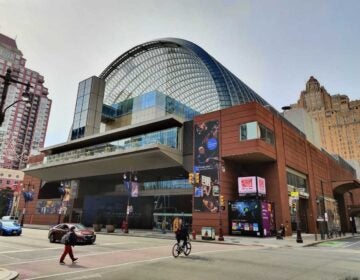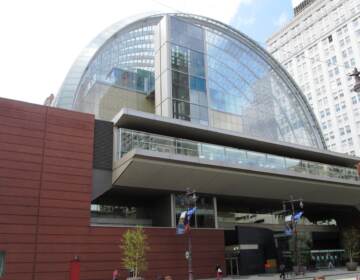‘It was a family job’: After 48 years, a friendly face at the Academy of Music retires
For 48 years, Cornell Wood ushered generations of Philadelphians into the arts.
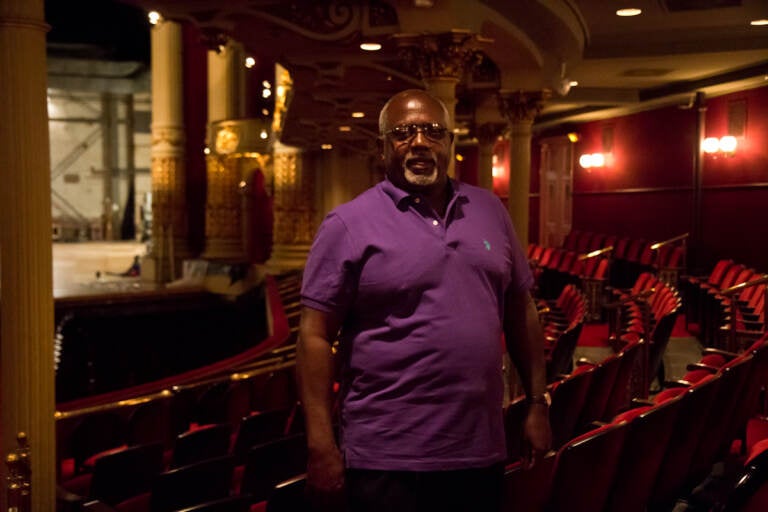
Cornell Wood has worked at the Academy of Music as an usher for 47 years, since September of 1973. His greeting was often the first guests received at concerts and events. He retires from his position as house manager this year. (Kimberly Paynter/WHYY)
From his post at the front doors, Cornell Wood has welcomed generations of Philadelphians into the Academy of Music on South Broad Street, for half a century.
“I always looked at it as: They’re coming into my house,” he said. “So our audience, we want to treat them just like if they came to your house. You want to treat them with the utmost respect and give them a special event out.’
The Academy was sometimes literally Wood’s home. As late-night performances bled into early-morning matinee shifts, he sometimes stayed overnight in a small bedroom built into the Academy for that purpose.
“It was my home. I spent more time here than I spent at home,” said Wood. “A lot of times I felt as though I was married to this building.”
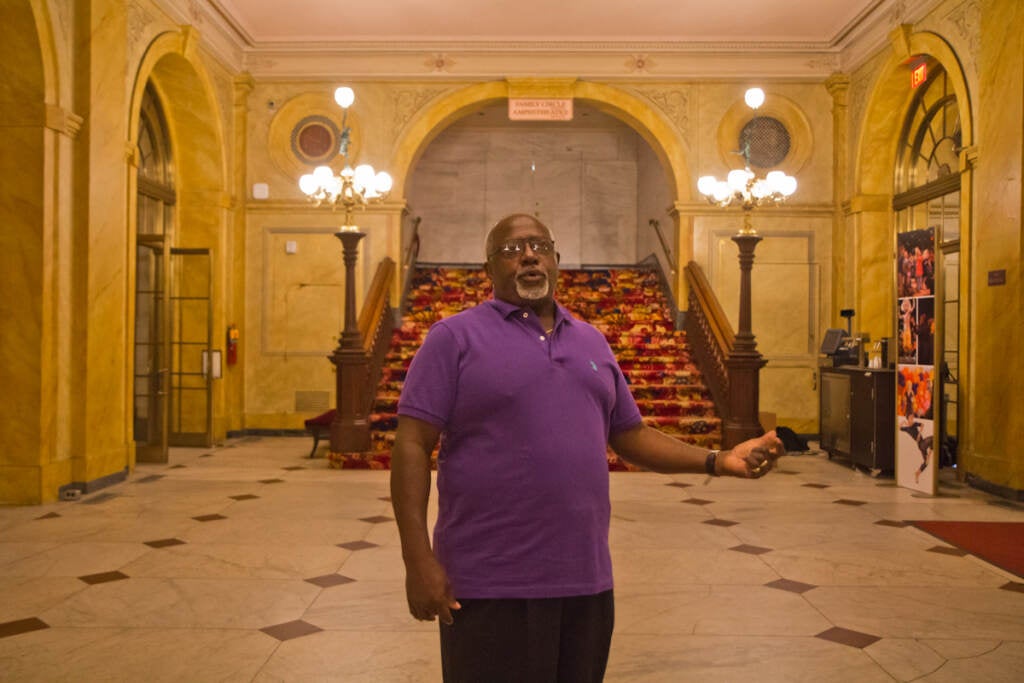
When Wood started working at the Academy in 1973, an usher position was seen as a lifelong career, a coveted job that you stayed with until you passed it along to a friend or relative. Wood came in as a teenager and noticed most of his colleagues were much older.
Now, he is one of those older guys. A grandfather of seven, Wood retired in July after 48 years.
The beginning of the job was rocky. When he arrived as a teenager, Wood had never been to the Academy of Music and knew nothing about the kinds of performances it hosted inside as the home of the Philadelphia Orchestra, the Pennsylvania Ballet (now the Philadelphia Ballet), and the Opera Company of Philadelphia (now Opera Philadelphia).
He recalls applying for the job on the suggestion of a friend, and being hired on the spot by then Head Usher Marc Scuncio. Wood did not know until the next night, when he reported to work, that he was the only Black person on staff.
“I was a little shocked when I found out I was the only one of color that was here as an usher,” he said. “I started to wonder, what did I get myself into?”
At first Wood felt alienated from both the guests and staff because of his skin color. He immediately started to reconsider the job.
“I’d ask people: may I help them? They refused help or they didn’t want to be bothered with me at that point in time,” Wood recalled. “I could only get so much from the staff members because they were a lot older and they just came from a different age and time. With all those challenges that I was facing, it was really hard to think that I was going to be here very long.”
Wood praises the management of the Academy for sticking by him, and supporting him when incidents would occur.
There are about 60 ushers on staff just at the Academy of Music, and more at the Kimmel Center’s other buildings clustered on the Avenue of the Arts. Ushers will often jump from building to building as the need arises.
The ushers are the staff with the most direct, personal contact with guests at the Academy of Music. They help people find their seats, and find the bathroom. They help sneak people to their seats after the curtain rises, and slip them out in the dark if they need to leave early, and calm fussy toddlers. Wood said he rarely got to see for himself the performances on stage while he worked, because there was always an issue to address in the lobby or hallways.
Inevitably, relationships build between ushers and regulars. Wood remembers early performances of the Orchestra’s Sound All Around, music and storytelling concerts for families in the upper ballroom of the Academy.
“One of the guests that came into the ballroom when they first started out, they had a young daughter. Through the years their child grew up and brought their kid back, and they asked me, ‘Are you still here?’” said Wood. “It was really special to see her fully grown and watch her kid start to learn the same thing in the music world, just like she did.”
Wood became the first Black Head Usher at the Academy, managing the entire usher staff, and brought his own family into his second home: his brothers are ushers and his daughters also work for the Academy. His grandchildren would visit him at the Academy when he was not working a performance, to play in the halls.
Wood has favorite moments at the Academy: the first time the elaborate Lion King Broadway musical came to its stage, seeing the Lipizzaner horses from Vienna prancing on stage, and when filmmaker Martin Scorcese came to shoot the opera scenes for his film “The Age of Innocence.”
But mostly it is the building itself that Wood is enamored of, the Grand Old Lady of Locust Street built in 1855 with its ornate Baroque Revival interior.
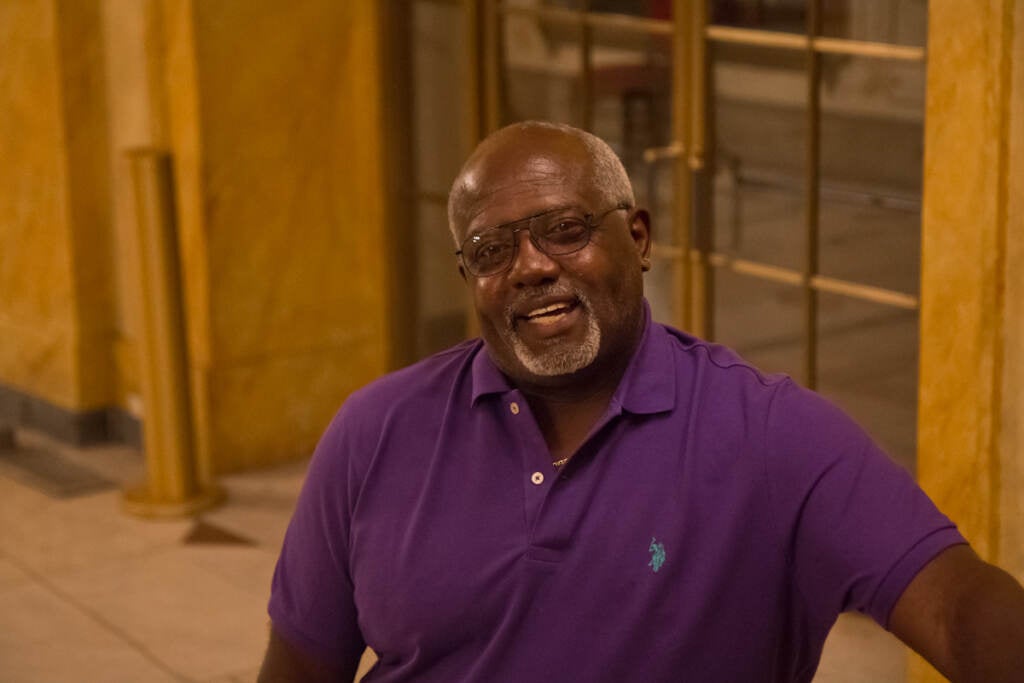
He says patrons of an earlier era had more respect for the building, than many of today’s guests.
“Everybody I used to talk to, somebody’s grandparent had some connection to this building. They were more active towards the building and what the building stood for than today,” said Wood. “Today, they don’t look at the building as a place to be seen, just somewhere where they hear some music and go home. Back in the day, because the building was the art, the anniversaries that they gave showed they really cared about the building itself.”
Now that he has retired, Wood will miss the building and the people that kept him in it over his long career: his staff, the Academy management, and the generations of guests whom he helped usher into a life of art appreciation.
“It was a family job. It certainly was. That’s why I wouldn’t trade it in for nothing,” he said. “But, like I said at the beginning, I thought I was only going to last 15 minutes.”

Get daily updates from WHYY News!
WHYY is your source for fact-based, in-depth journalism and information. As a nonprofit organization, we rely on financial support from readers like you. Please give today.






